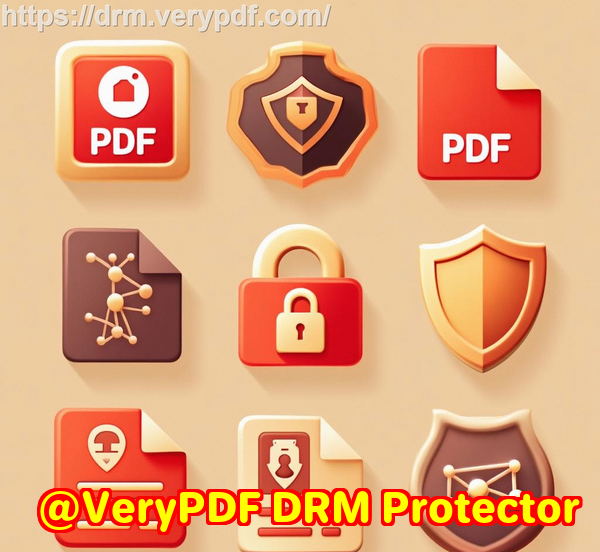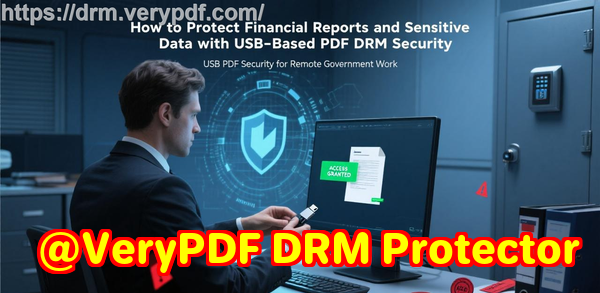How to prevent DRM removal attempts and protect PDFs containing paid or sensitive content from illegal sharing online
As a professor, I’ve had those frustrating mornings when I discover my lecture slides have mysteriously appeared on student forums. You spend hours preparing detailed course materials, only to find them floating around where anyone could access them. It’s not just annoyingit can compromise the integrity of your course, devalue paid content, and even make students feel entitled to share copyrighted materials without permission. Protecting PDFs from illegal sharing and stopping DRM removal attempts has become an essential part of managing digital course content. That’s where tools like VeryPDF DRM Protector come in, giving educators control and peace of mind.

One of the most common headaches I face is students sharing PDFs of assignments or lecture notes. Even when files are distributed for legitimate reasons, they can quickly end up on messaging apps, forums, or cloud drives. Suddenly, content intended for a closed classroom becomes accessible to anyone. This not only undermines your authority but also affects students who rely on accessing materials the right way.
Another challenge is unauthorized copying, printing, or converting of PDFs. I remember giving out a set of homework PDFs for an advanced course. Within a week, several students had converted the files to Word and shared editable versions. It’s one thing for students to reference materials, but another for them to redistribute or modify content without permission. These actions can dilute the value of your paid courses or proprietary teaching materials.
Finally, there’s the issue of losing control over sensitive or paid content. Online courses, premium resources, and research PDFs are investmentsboth for the instructor and the students. Once files are out in the wild, it’s nearly impossible to track who has them or prevent misuse. The thought of a carefully prepared lecture appearing in the wrong hands is enough to keep any educator awake at night.
This is where VeryPDF DRM Protector changes the game. The software allows me to secure every PDF I distribute, whether it’s lecture slides, homework, or paid course materials. With it, I can restrict access to only enrolled students or specific users, ensuring that only the intended audience can open the documents. Printing, copying, forwarding, and even attempts to remove DRM are blocked automatically.
One feature I’ve found invaluable is the ability to stop printing entirely or limit prints. For a large class, this ensures students can reference materials digitally without producing multiple hard copies that could easily circulate. I’ve also used the dynamic watermark feature, which embeds student-specific details like name and email directly onto the document. Not only does this deter sharing, but if a copy does end up online, it’s easy to trace back to the source.
Preventing DRM removal is another key benefit. Unlike standard password-protected PDFs or browser-based viewers, VeryPDF’s system locks files to specific devices or USB sticks. This means even if someone tries to bypass protections using scripts or plugins, the document remains secure. I’ve seen colleagues struggle with data room security, only to discover that shared credentials allowed unauthorized access. With VeryPDF, decryption keys are handled behind the scenes, and students never enter credentials that could be passed around.
In practical classroom terms, setting up protections is surprisingly simple. Here’s how I manage it:
-
Restrict Access: Assign PDFs to enrolled students only, either by device, USB, or web viewer.
-
Control Printing: Decide whether students can print at all, or limit the number of prints.
-
Apply Watermarks: Enable dynamic watermarks displaying user info for every view or print.
-
Set Expiry Dates: PDFs can expire after a fixed date, a certain number of views, or prints.
-
Revoke Access: Instantly revoke access to any document if needed, even after distribution.
I recall a recent course where I distributed a set of premium research PDFs. Normally, I would worry about them leaking online. Using VeryPDF DRM Protector, I locked the PDFs to student devices and set dynamic watermarks. Weeks later, one student accidentally shared a screenshot with a friend. Because the watermark clearly identified the original user, I was able to address it quickly, preventing wider circulation. It was a small incident, but it demonstrated how effective these protections can be in real scenarios.
Another classroom scenario involved online homework submissions. Students often try to convert PDF assignments to Word or Excel to manipulate the content. With DRM protections in place, these conversion attempts were blocked completely. This saved me hours of chasing down altered assignments and maintained academic integrity across the class.
For educators distributing paid courses online, VeryPDF DRM Protector also provides anti-piracy safeguards that make a huge difference. PDFs can no longer be converted to other formats, screen captured, or shared through Zoom and other screen-sharing tools. Even if someone tries, the software prevents screenshots and records no useful output. This kind of protection is critical when you’re monetising educational content or releasing sensitive research.
Here are some tips for making the most of PDF DRM in your teaching:
-
Always lock files to devices or USB drives to prevent unauthorized distribution.
-
Use dynamic watermarks on every PDF to discourage students from photographing screens or printing and sharing.
-
Limit printing and set clear expiry rules so content isn’t misused after it’s no longer relevant.
-
Regularly review access logs to track who viewed or printed files.
-
Revoke access immediately if needed to prevent unauthorized circulation.
I’ve personally found that implementing these protections has simplified my workflow. I spend less time worrying about leaks, and students understand that the content is protected. It also reassures parents and administrators that paid or sensitive materials are handled responsibly. VeryPDF DRM Protector turns a potentially stressful part of digital teaching into a smooth, manageable process.
Ultimately, the goal is to maintain control over your teaching materials while giving students secure access. VeryPDF DRM Protector helps me achieve that balance. By preventing DRM removal, blocking unauthorized printing and copying, and providing detailed watermarks and revocation controls, I can confidently distribute PDFs knowing that my work remains protected.
I highly recommend this to anyone distributing PDFs to students, whether for homework, lecture slides, or premium course content. It’s straightforward to use, highly effective, and protects your intellectual property in ways that standard PDF protections cannot.
Try it now and protect your course materials: https://drm.verypdf.com
Start your free trial today and regain control over your PDFs.
FAQs
How can I limit student access to PDFs?
You can restrict access to enrolled students only by locking PDFs to specific devices, USB drives, or a web viewer. This prevents unauthorized users from opening the files.
Can students still read PDFs without copying, printing, or converting them?
Yes. VeryPDF DRM Protector allows students to view content safely while preventing printing, copying, forwarding, or conversion.
How can I track who accessed my PDFs?
Dynamic watermarks and access logs let you identify which users viewed or printed files, making it easy to monitor usage.
Does it prevent PDF piracy and unauthorized sharing?
Absolutely. It stops DRM removal attempts, blocks screen grabs, prevents conversion to other formats, and allows you to revoke access at any time.
How easy is it to distribute protected lecture slides and homework?
Very simple. You can distribute PDFs by email, web, or USB. The documents remain protected without requiring students to enter login credentials.
Can I expire or revoke access to PDFs after distribution?
Yes. You can set PDFs to expire after a certain number of views, prints, days, or on a fixed date. Access can also be revoked instantly at any time.
Will dynamic watermarks help deter students from sharing files?
Definitely. Watermarks display user-specific information such as name, email, and date/time on every view or print, discouraging redistribution.
Tags/Keywords
protect course PDFs, prevent PDF piracy, stop students sharing homework, secure lecture materials, prevent DRM removal, anti-conversion PDF DRM, restrict PDF access, secure educational content, block PDF copying, online course protection




